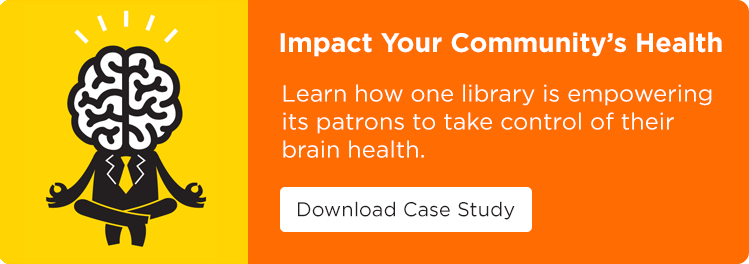
5 Essential Partners for Your Library’s Health Initiatives
Your library provides valuable services to your community, from affordable entertainment to educational programming on such important topics as health literacy. While you are uniquely positioned to offer a range of valuable resources to the patrons you serve, you don’t have to go about this important work alone. Many libraries have increased the success of their health programs by establishing strong bonds with organizations, associations and businesses that share a dedication to serving their local communities.
By working with those who are like-minded in their missions, you can save time and effort by splitting up the tasks associated with running your programs. You can also drive traffic to your library’s programs by getting in front of audiences that may not have previously known about what you have to offer them. To help you get started establishing partnerships, we offer the following five local organizations as key community partners who can help you get the most out of your library’s health initiatives.
1. Chambers of Commerce
To reach new adult populations and spur word-of-mouth promotion for your health initiatives, consider partnering with local associations that promote and protect the interests of your business community. Feedback from the employers, small-business owners and industry councils represented within your chamber can help you determine which programs and services to offer. Some communities even have chambers focused on specific ethnicities, which can help you ensure that you’re meeting the needs of all the members of your community.
2. Community and Youth Services Organizations
Community and youth services organizations provide an array of public services, including health and recreation programs. Organizations in this category include the following:
- After-school programs
- Community centers
- Day cares
- Boys & Girls Clubs
- YMCAs
- Kiwanis, Lions and Rotary groups
- Parks and recreation departments
These organizations often cater to youth and adults who have already expressed an interest in physical and mental health, and the benefits of working with these groups are infinite. For one, community and youth services organizations may already be offering health-oriented programming; by eliminating duplication of programming and pooling resources, you both can save time and money. If you have complementary programs, you’ll gain mutual benefit by promoting each other’s programs.
Groups like YMCAs, community centers, and parks and rec departments may also be willing to host library programs on-site, provide feedback on what types of programs their users are interested in, donate free passes for patrons to check out from the library, or co-host group hikes and programs focusing on outdoor safety.
3. Local Health Organizations
Hospitals and public health clinics are in the business of caring about your community’s health, so they can really help jump-start your health initiatives. These organizations have a sense of the types of physical and mental health issues most relevant to your community. Consider having nurses, doctors or other health professionals come to your library to offer health screenings, vaccines and informational sessions on community health issues.
You could also catch the attention of community members waiting to see health professionals by promoting your health programming within waiting rooms and patient rooms. Take this idea a step further by offering programming that can be utilized in these locations while waiting:
- Set up a lending library or free book exchange in your local pediatric waiting room.
- Offer prerecorded storytimes to play in pediatric waiting rooms with a plug for your library’s storytime at the end.
- Encourage clinic or hospital waiting room patients and caregivers to pass the time by accessing and engaging with brain training software like BrainHQ™ through your library’s website.
4. Senior Centers and Service Organizations
Nursing homes, senior centers and local agencies on aging are another natural fit for your health initiatives. While some seniors have poor or declining health and require outreach services, others are active and in good health. Both of these groups are often health conscious and looking for ways to improve their physical and mental health.
Work with activity coordinators in these organizations to find overlap between their programs and those offered at your library. Be sure to keep your health screenings, fitness classes and sessions on healthy eating fun! Gaming activities appeal to all ages; offer things like Wii fitness games and BrainHQ to help keep older individuals’ minds and bodies in shape without it feeling like work.
5. Local Government and Social Services
Local government and social services organizations are great places to build community health partnerships. Local health departments have their own public health initiatives, and their staffs know the priorities of the communities they serve.
These organizations already do a lot of work through local schools, parks and recreation departments, and hospitals, making them a direct conduit to the populations you want to reach. Whether your library is offering fitness classes or checking out bicycles and snowshoes to patrons, health departments and social services organizations can help connect your services to the most people.
Partnering with local community associations is just a start when it comes to promoting health literacy in your community. As you plan for how you’ll make an impact in this important area, reference our roundup of valuable health resources, and see how Nicholson Memorial Library System (TX) is improving their community’s brain health in this case study.
Sources
“Beyond books: how libraries can help meet health needs,” STAT
“The Challenges and Opportunities of Serving America’s Elders,” ALA
“Hospitals & Health Care Systems: Natural Partners for Library Health Programming,”
Programming Librarian
“Parks & Rec: A Health Programming Partner,” Programming Librarian
“Partnering with Your Local Health Department,” Programming Librarian




